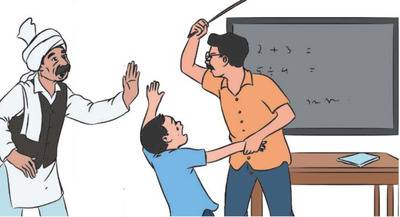Educators need to think beyond corporal punishments

Corporal punishment is a highly prevalent practice in schools, yet it has not been demonstrated to be effective in training children.
Studies show that punitive teaching strategies tend to depress academic performance as well as to have adverse effects on the personality development of the student. The increasing violence involving children and youth inside and outside the school campuses calls for greater attention to the moulding of the character and values of students.
Education is not limited to imparting knowledge, learning and passing examinations. It is a collective responsibility of school management, teachers, parents and the whole of civil society. In this article, I would like to examine the negative impact of corporal punishments still used in many schools and educational settings.
One negative effect of corporal punishment is that it teaches children to be aggressive and use aggressive alternatives in solving problems and resolving conflicts.
Most parents and teachers, who make frequent use of physical or psychological punishment in training their children, do so without full realisation of the negative effects.
Studies show that parental punitiveness is positively correlated with various forms of psychopathology, especially delinquency and aggressive acting-out behaviour.
Punishment aims to reduce or eliminate the behaviour that is being punished. But studies reveal that a change is rarely obtained by the use of corporal punishment.
Teachers and educators function as models, sources of emotional security, and socializers and protectors. Because of the close relationship between child and teacher, the effect of certain types of punishment, especially corporal punishment, extends beyond the unacceptable behaviour. It may lead to unintended and undesired side effects.
It is important to go beyond the immediate result of getting change through punishment and examine the consequence and impact on the personality of the student.
Some of the behaviours that make a student eligible for corporal punishment are failure to do homework or other assignments, not standing properly in line during assemblies, truancy, chewing gum, congregating in halls and lavatories, using mobile phones, playing video games, reading comic books, talking out of place, smoking on school premises, impertinence, not paying attention, using profane or obscene language, cheating, violent behaviour, sailing paper airplanes, failing to say "Sir", not wearing the uniform, not bringing textbooks, striking classmates and many other.
A child who is hit for these or similar infringements not only becomes motivated by fear to avoid these behaviours but also learns that aggression is appropriate under certain circumstances; namely when one is disappointed or frustrated by others. Hitting a child for some infraction by the teacher immediately or by the principal, later on, does not help the child to get rid of such behaviours. Some of these infractions are more a matter of manners than morals; some infractions are on the interpersonal level and are serious. But often there is an imbalance between the severity of the infraction and the severity of punishment.
Studies also reveal that the use of corporal punishment is discriminatory: boys are more often subject to physical punishment than girls; the poor are more subject to corporal punishment than the rich and the well-to-do and the influential.
Corporal punishment is often injudiciously applied to the very young, the intellectually limited, or the emotionally disturbed child. The increased incidence of violence and injury caused by corporal punishments is a matter of concern in the professional and academic communities.
Society's responsibility for the protection of children and the differently-abled is an almost universally recognised need. The paradox is in the fact that the objects of corporal punishment in schools are children rather than criminals.
Often there is a clash between a child's need or right not to be the object of physical abuse versus the teacher's right or role to maintain authority and manage a classroom.
A joint statement on corporal punishment issued in the USA some years ago states:
The use of physical violence on school children is an affront to democratic values and an infringement of individual rights. It is a degrading, dehumanizing and counter-productive approach to the maintenance of discipline in the classroom and should be outlawed from educational institutions.
Scholars have argued that corporal punishment in schools is an expression of violence against the children of our societies and indeed corporal punishments may be one manifestation of violence deeply rooted in our society. Sometimes it also manifests our understanding of the child as a creature with low status, inherently antisocial, in need of strong, even repressive, tactics, and requiring discipline based on fear, especially fear of physical punishment. The unwillingness of educational administrators to relinquish power and control represents a significant obstacle to change.
Teacher Stress
Teacher stress plays a significant role in punitive measures ranging from verbal criticism to more severe and harmful abusive displays. Several experienced teachers cite interaction with children as the most frequent source of stress. There are also job-related administrative and managerial tensions. Parental expectations, professional standards, and administrative demands affect the teacher. However, corporal punishment in the school does not achieve the goals that the teacher is seeking- a reduction of pressure and stress, and an improvement of disciple and classroom management.
Proper management of stress, broadening of a social support system, and development of effective discipline strategies to deal with student misbehaviour and other classroom problems can help reduce teacher stress.
Towards a theory of Discipline
Verbal admonitions with age-appropriate explanations are useful.
"No, don't play with the microphone; it may break and we won't be able to use it”, provides the child with a verbal structure that the child can repeat. It can help regulate his/her behaviour. Changing the environment and removing objects that evoke undesired behaviours are also useful.
Parents and teachers must try to prevent impulsive actions from occurring. Provide the child with verbal explanations and other responses that will facilitate the development of self-control.
Creative activities: sports and games, dramatics, scouting, group activity, clubs and association, and social service-oriented programmes are ways to use creatively the rich potential in the students. Distributive punishments like the loss of some privilege can be meted out.
Objectional habits: rather than punishing a child for moving about restlessly, the teacher should reward the child when he or she is sitting engrossed in an academic task. The reward may be as simple as congratulating or praising the child.
Premeditated and objectional behaviours: use distributive punishments. If the behaviour persists, it is no use in increasing punishments. You need to seek outside help and guidance. Training towards more positive social behaviours can be introduced.
A more empathic child is more able to perceive events from the perspective of others and be able to share effective experiences. Because of their ability to experience the other's pain as well as pleasure and the capacity to understand a situation in terms of the other's frame of reference, an empathic child is less likely to use aggressive solutions in conflict situations.
Other alternatives to physical punishments include orientation and counselling for parents, teacher consultation, chores, responsibility programmes, special education services, expulsion, behaviour modification, discussions and follow-up programs.
Father George Plathottam sdb is the Executive Secretary of the FABC Office of Social Communication
Radio Veritas Asia (RVA), a media platform of the Catholic Church, aims to share Christ. RVA started in 1969 as a continental Catholic radio station to serve Asian countries in their respective local language, thus earning the tag “the Voice of Asian Christianity.” Responding to the emerging context, RVA embraced media platforms to connect with the global Asian audience via its 21 language websites and various social media platforms.
Comments
The author has brought to light useful tenets and principles for building enduring educational rapport between parents/teachers with children/students for creative and successful pedagogical interventions according to studies with their veritable results. Well done, Fr George.

















- Reply
Permalink